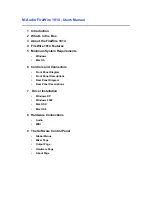
COPYRIGHT © 2001 CANON INC.
2000 2000 2000 2000
CANON SUPER G3 FAX BOARD-J1 REV.0 JUNE 2001
INTRODUCTION
iii
The following rules apply throughout this Service Manual:
1. Each chapter contains sections explaining the purpose of specific functions and the re-
lationship between electrical and mechanical systems with reference to the timing of
operation.
In the diagrams,
represents the path of mechanical drive; where a signal name
accompanies the symbol
, the arrow indicates the direction of the electric sig-
nal.
The expression “turn on the power” means flipping on the power switch, closing the
front door, and closing the delivery unit door, which results in supplying the machine
with power.
2. In the digital circuits, ‘1’ is used to indicate that the voltage level of a given signal is
“High,” while ‘0’ is used to indicate “Low.” (The voltage value, however, differs from
circuit to circuit.) In addition, the asterisk (*) as in “DRMD*” indicates that the
DRMD signal goes on when ‘0’.
In practically all cases, the internal mechanisms of a microprocessor cannot be
checked in the field. Therefore, the operations of the microprocessors used in the ma-
chines are not discussed: they are explained in terms of from sensors to the input of the
DC controller PCB and from the output of the DC controller PCB to the loads.
The descriptions in this Service Manual are subject to change without notice for product
improvement or other purposes, and major changes will be communicated in the form of
Service Information bulletins.
All service persons are expected to have a good understanding of the contents of this Ser-
vice Manual and all relevant Service Information bulletins and be able to identify and isolate
faults in the machine.






































